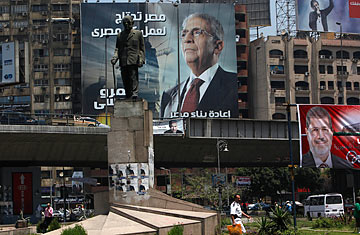
A statue of Egypt's Nobel laureate Naguib Mahfouz is back dropped with two electoral posters of presidential candidates Amr Moussa, left with Arabic that reads, "Egypt's reconstruction needs the effort of all Egyptians," and his fellow candidate Mohammed Morsi, right, in Cairo, May 8, 2012.
The way his campaign bus lurches to a stop every so often might seem haphazard for the frontrunner in Egypt's presidential election. But those constant pauses are part of a calculated plan as Amr Moussa travels through the traffic-clogged back roads of Egypt's impoverished Nile Delta. The bus stops so that Moussa can greet flocks of villagers from the bus doorway, or give a short address on a prepared stage. "We have a concept on the campaign: Whoever is going to win this election is whoever has been seen by the most people, heard by the most people, and met by the most people," says Ahmed Kamal, a campaign spokesman, as the Egyptian presidential frontrunner descends from the bus in one dusty farming town. "When you're talking about these areas that were overlooked by the ex-regime, having a visit from a presidential candidate is something they've never had before," he adds as a frenzied throng of fans push against the equally frenzied circle of bodyguards surrounding Moussa, who was once a popular foreign minister in the overthrown regime of Hosni Mubarak. "It means a lot to them."
The village-to-village approach — in fact, the sheer concept of campaigning — is a new one in the Arab world's largest country, where Egyptians will cast their votes to select the first new president in three decades on May 23 and 24. Egypt is the first of the so-called Arab Spring states to hold a presidential election, since a series of popular revolts last year overthrew dictators from Tunisia to Libya, including Egypt's own President Mubarak.
But as Moussa and the other Egyptian frontrunners make their rounds through Egypt's impoverished towns and cities, reaching out to constituents in a way that Mubarak never bothered to do, they're also confronted with the tough reality of the territory they're hoping to rule. Egypt's tourism-driven economy is in shambles — and has been for more than a year. Nearly half of Egypt's 85 million live on less than $2 a day. The Nile Delta, Egypt's breadbasket, is one the most populous regions in the country, but many say they have only limited access to clean water, modern sewage systems, and reliable electricity. At a recent campaign stop alongside burning trash piles and sewage-fed canals, Moussa promised to make farmers "number one." His chief rival, Abdel Moneim Aboul Fotouh, a physician and an independent Islamist, has pledged to pour money into the budget for healthcare and education reform. And both have said, however vaguely, that they'll put an end to the endemic corruption that has permeated almost every aspect of economic and political life in this country for years.
But, in today's Egyptian politics, the past matters as much as the present — if not more. Indeed, at the country's first ever presidential debate, held last Thursday night between Moussa and Aboul Fotouh, the former chose to focus his attacks on Aboul Fotouh's ties to conservative Islamist groups, while the latter questioned Moussa's relationship to the old regime. Each appeared to be banking on the idea that the other's unsavory trait — "ex-regime" versus "Islamist" — is worse in the eyes of voters. And indeed, some cynics say, it may come down to that: whose past is less bad. Or, in a race of poorly defined visions for what comes next, the choice may simply lie in who Egyptians think will be best able to bring about an escape from past authoritarianism and past economic turmoil. And while the latest polls put Moussa in the lead, most political analysts say that there are far too many undecided Egyptians — and indeed, too short a history in national political polling — to be sure of anything at this point.
It's Moussa's experience — as a former foreign minister and then the head of the Cairo-based Arab League for a decade — that his campaign has sought to emphasize over the specifics of what comes next. "You cannot be a novice or somebody who never had anything to do with government to rule Egypt at this very crucial juncture," Moussa told TIME in a recent interview. "In a time of a very serious crisis, you need expertise, you need experience, you need international relations, you need special relations with the Arab world." The message seems to be registering with voters. "I've admired him since I was young, in university," says Ahmed Abdel Lahib, a teacher in the delta village of Mit Faris, where Moussa stopped to make a speech last week. He's experienced and charismatic, he adds — a legacy that makes him a man for the moment. "Egypt needs a person like Amr Moussa."
Campaign insiders admit that the old regime label has presented a formidable obstacle. The idea that someone is felool — literally, a remnant of the old regime — has become a toxic point of political rhetoric, his spokesman Kamal concedes. But the positive side, he says, is this: "People know that he has the connections, the experience, and the knowledge."
